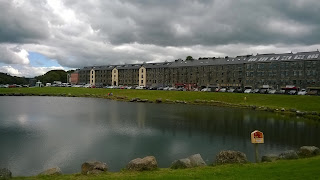By Kathleen Handrick
2017 will always be remembered in Manchester as the year of the horrific terrorist attack at the Arena, where twenty-two adults and children were killed, along with many scores more who were injured and traumatised. Manchester Irish Writers responded to this appalling, shocking tragedy in the only way we could: through our writing, which you can read here.
2017 also saw the 150th anniversary of another tragic chapter in the city's history: the execution at Salford Gaol of Irishmen William Philip Allen, Michael O'Brien, and Michael Larkin. They were hanged for the murder of police Sergeant Charles Brett, who was shot during an attempt to free Fenian leaders. None of the three men admitted to firing the shot but were nevertheless convicted. Two of the executions were horribly botched by the hangman. There was widespread indignation in Ireland and internationally. The three men became known as the Manchester Martyrs. MIW marked this important event in the histories of Ireland and Manchester with an evening of commemorative writing and music at the Irish World Heritage Centre.
As a group of writers, we discuss our work and reflect on themes and linkages as part of our creative process. In the development of our writing in this tragic year, our member Kathleen Handrick wrote this reflection, called 'Looking Back.' Kathleen says: 'I found this a difficult subject and have approached it from my own discussion with myself on the meaning of 'martyr' and its development through my changing life experiences. It is a personal view.'
2017 will always be remembered in Manchester as the year of the horrific terrorist attack at the Arena, where twenty-two adults and children were killed, along with many scores more who were injured and traumatised. Manchester Irish Writers responded to this appalling, shocking tragedy in the only way we could: through our writing, which you can read here.
2017 also saw the 150th anniversary of another tragic chapter in the city's history: the execution at Salford Gaol of Irishmen William Philip Allen, Michael O'Brien, and Michael Larkin. They were hanged for the murder of police Sergeant Charles Brett, who was shot during an attempt to free Fenian leaders. None of the three men admitted to firing the shot but were nevertheless convicted. Two of the executions were horribly botched by the hangman. There was widespread indignation in Ireland and internationally. The three men became known as the Manchester Martyrs. MIW marked this important event in the histories of Ireland and Manchester with an evening of commemorative writing and music at the Irish World Heritage Centre.
As a group of writers, we discuss our work and reflect on themes and linkages as part of our creative process. In the development of our writing in this tragic year, our member Kathleen Handrick wrote this reflection, called 'Looking Back.' Kathleen says: 'I found this a difficult subject and have approached it from my own discussion with myself on the meaning of 'martyr' and its development through my changing life experiences. It is a personal view.'
LOOKING BACK
![Domenichino [Public domain], via Wikimedia Commons](https://blogger.googleusercontent.com/img/b/R29vZ2xl/AVvXsEjv1y0l1-nZ4K_FxMclFTlDNA7NOOCkBJ-y5-J7MuZs0bXDSTgwVQNyxRFZbuYhYTbe0THZhz8jaFbMBqvq1zMDUJ4ikL7aUR5a0DaDpZ-3dHitXPK3tYAwd9BBQbSfjMe4r_8xPEPUbmav/s320/2872-saint-agnes-domenichino.jpg) |
| Saint Agnes Public domain |
“Now isn't that a wonderful thing – to die for Our Lord like that.”
Standing in front of the class, nodding in satisfaction; hands clasped across her rounded form; her wide smile encompassed us all. She had done her duty.
Eight-year-old hearts swelled with innocent fervour thinking of the young martyr. Willing to give her life for her beliefs.
We stood proudly; we sang of our fathers' holy faith.
Determined that we would be loyal to the end.
But - memories and allegiances grow dim. We outgrew those stories and traditions. There were changing times.
We enjoyed the upheaval. New found freedoms flourished. Protests and power emerged.
We recognised social and racial injustice in our widening world and responded.
We empathised; supported strangers in their suffering. Joined their cause.
We dreamed; we marched; we sang our anthem in faith.
We shall overcome one day.
Discord though was never far away. There was unrest.
Dissatisfaction; conflict; the old order could not be forgotten.
When talking failed, action followed.
Strikes and riots to protect jobs; food for families; self-respect.
We rallied to their aid - a glimmer of hope in those dark days.
We stood firm. Together we marched. Together we sang.
With Welsh choirs and Yorkshire bands.
Were they martyrs?
Martin Luther King, activist and orator, assassinated;
Davy Jones and Joe Green, miners, killed on the picket line.
They died, as others in consequence of their beliefs.
The word is tainted of late. Our pride in freedom, rights, choices, is challenged.
It causes me to wonder.
I think of the present martyrs of Manchester: Alison and Lisa and the others.
I think especially of Saffie, eight years old –killed in her pursuit of freedom.
The freedom to attend a pop concert and enjoy herself.
We gather and we sing
Don't Look Back in Anger.
That's difficult.
It causes me to wonder…
~~~~~~~~~~~
Looking Back © Kathleen Handrick
Kathleen Handrick is retired and lives in Oldham with her husband and family. She joined MIW in 2013 as a novice writer and enjoys participating in the writers’ events. Her Irish roots are in County Mayo.








![By NAC (Own work) [CC BY-SA 4.0 (https://creativecommons.org/licenses/by-sa/4.0)], via Wikimedia Commons](https://blogger.googleusercontent.com/img/b/R29vZ2xl/AVvXsEitLXZESOKecbr29oytxjcdzYSv3ijc5jWz0Zga-8nSaDL4NMgCweGKHsoAEU5vSJJuyXiXHsanw1kglF6OEfBS75oLM8xhwp3siTWu4KjUWKO4xwcCVbG6y6S1bqxxScdl3ZbdAVMN3EMV/s320/2+North_Atlantic_010917_2.jpg)
![By Robin Hutton from Perth, Western Australia (Flickr) [Public domain], via Wikimedia Commons](https://blogger.googleusercontent.com/img/b/R29vZ2xl/AVvXsEg2kV2UzxN1BsXirW0OD7X9kcj1e5YLoAnvIOK447a_2WKHWuWun1DerFWxs1xlItG8lP8H0YKCNLxRd1Knz8yJdE_Dg3m2SyWrxmDcQApxB9ec8Ew14o_0YlX1yDXBMl9xJRsswQNf5mv7/s320/3+Percy_French_Mayo_Mermaids.jpg)

![By Sarah777 at English Wikipedia [Public domain], via Wikimedia Commons](https://blogger.googleusercontent.com/img/b/R29vZ2xl/AVvXsEjz4ODA5jCWXiCwO85RQhC47qsCFsXoiluPm4i1ldZCRxpRy03k5xb02jcV-XB4tp1A8bYRumEUiGObVUlzN1nVx5Wta5B_dIjg6xnAqhYe9cJ8KXl2XLVUWhcxImj9XHu5U3ztflPkx_-b/s320/5+RooskyShannon_Feb_2003_171.jpg)
![By J. G. O'Keeffe (1865-1937) (selbst eingescannt User:Cuchullain) [Public domain], via Wikimedia Commons](https://blogger.googleusercontent.com/img/b/R29vZ2xl/AVvXsEjqmcWO19QrUtyrLamK0Q9QDkf2hvup6h-CdtwxctNPAnGXeNggQFz0MvEeWQHrboxzvMALjK3Y3mxqOrHjwVup4qDKVwI-j4enl8kWlNffXbXui1JYxpTfsEWkuSbxkFL0oVrYVySpq5tq/s1600/6+A_Handbook_of_Irish_Dances.jpg)




































